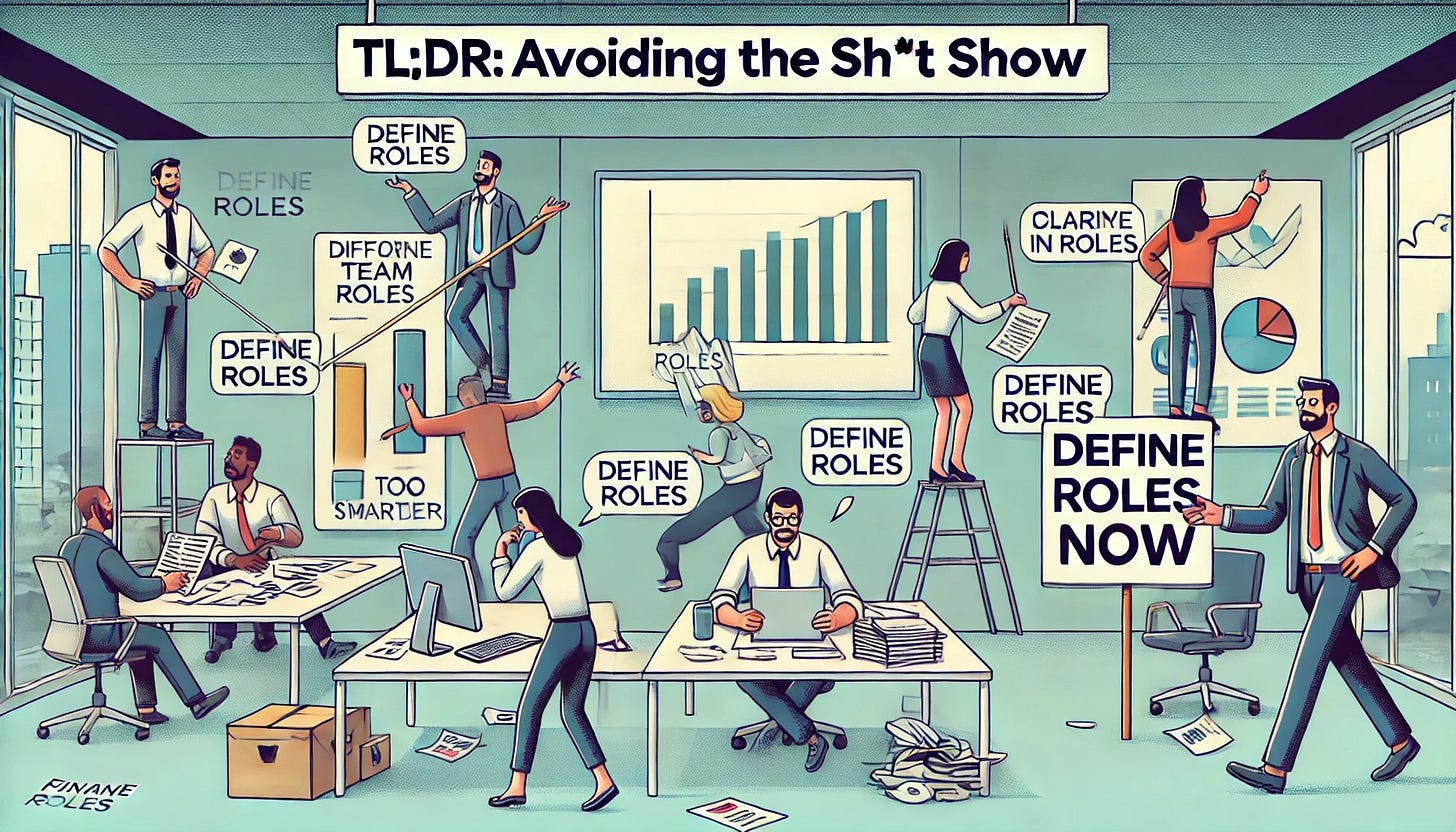Why Most Startups Die Because Founders Don’t Divide Roles (and How to Fix It)
How clear role division can make or break your startup, and why defining leadership early is essential for growth and investor confidence.
Let’s face it: startups fail. But here’s the real kicker—it’s not just the market or the product that kills them. More often than you think, it’s co-founder conflict.
The people who should be the strongest team often turn into each other’s biggest obstacles.
Lack of clarity in roles is a startup killer. Everyone wants to do everything because it feels good. It’s all smiles and handshakes until tough decisions need to be made, and no one knows who’s calling the final shot.
I’ve been there, and let me tell you, it’s a mess. Dividing roles early on? It trumps that “feel-good” vibe of everyone doing everything together.
Why This Happens?
Look, most of us avoid uncomfortable conversations, right? We don’t want to say, "You do this, and I’ll do that," because it feels like drawing lines. But real talk? Not having those tough conversations will kill your company faster than a bad product ever could.
I’ve seen startups where the product head is suddenly in charge of sales, and the support head is managing product development. What happens? Total chaos.
A perfect example of this is a story I recently heard from an SEO expert(Andrew Ansley) who was let go from his role at a marketing agency. Despite his expertise and ambition to scale the company, leadership decisions and an undefined direction caused the entire ads and creative divisions to disappear. Client churn set in. While his skill set was being underutilized, it wasn’t about his talent—it was about unclear structures and conflicting priorities.
As he said, “Their systems prevented them from scaling.” When no one’s clear on their role or the company’s focus, it doesn’t matter how skilled your team is—you won’t grow.
Lessons Learned from Experts like Andrew
Andrew Ansley, an SEO expert who recently faced a major setback when he was let go from his job, losing $154,000 of dependable income overnight. But instead of being defeated, he used this challenge as fuel to accelerate his personal and professional goals. Andrew’s approach to handling this situation offers powerful lessons for startups and individuals alike.
Here’s what we can learn from his mindset and apply to our ventures:
❌ Not defining roles early and clearly
❌ Letting fear of uncertainty paralyze action
❌ Waiting for everything to be perfect before making moves
So, how do you navigate similar challenges? Here are a few clear steps inspired by Andrew’s approach:
✅ Turn fear into motivation: Use uncertainty as a driving force to pursue your goals at an accelerated pace.
✅ Create an action plan immediately: Reach out to your network and offer your expertise; take steps, don’t wait.
✅ Prioritize consistency over perfection: Regularly post content or share your work, even if it’s not flawless.
When you apply these steps, just like Andrew did:
You’ll feel more empowered.
Your focus will sharpen, and your goals will become clearer.
Results will start to materialize faster than you expect.
The lesson is simple: It’s all about clarity and action. I know it’s easier said than done, but once you start implementing it, the results will compound over time. Without them, you risk falling into chaos and stagnation. Setbacks are often opportunities in disguise, offering you a chance to rebuild stronger.
It’s even worse when no one wants to answer the question: Who’s the final decision-maker? Investors ask, and if you don’t know, it’s a red flag. For the love of everything startup, have that conversation before someone else forces you to.
The CEO Problem
A CEO culture needs to be built early. I’m talking about having that one person who takes the final call when there’s a conflict. Founders can argue all day, but someone has to be the tie-breaker. Without that, you’re just driving in circles, burning fuel but getting nowhere.
And I’ve seen this firsthand. We were in a similar position once, facing internal conflicts and office politics. Everyone had strong opinions, but no one knew who had the final say. The lack of clarity created chaos, and things started to unravel. It wasn’t until we clearly defined roles and appointed a final decision-maker that things turned around. Suddenly, decisions were faster, execution was smoother, and the focus shifted from disagreements to growth.
What Investors Taught Us
Here’s a gem for you: seed-stage investors want to see clarity in roles. It’s one of the best pieces of advice we got early on. They don’t just throw money at chaos; they bet on teams that know who’s doing what. Investors don’t care about the “let’s all be equal” mentality. They care about results and clarity. If you’re fuzzy on this, good luck getting funded.
In the case of the SEO expert Andrew I mentioned earlier, he learned this lesson the hard way. When his company failed to define clear roles, they stagnated. Leadership couldn't focus, systems failed, and the result was the dissolution of entire departments. This lack of role clarity and direction is a red flag for investors, even if you have a solid business idea.
How to Fix It
Define Roles Early: Don’t wait until you’re knee-deep in problems. Divide and conquer from day one. Who’s handling the product? Who’s taking sales? Be specific.
Appoint a Final Decision-Maker: Whether it’s a CEO or a rotating leadership model, someone needs to take the call when it gets tough. Otherwise, you’ll just drown in disagreements.
Respect Expertise: If someone’s an expert in sales, let them handle it. Don’t have your product guy trying to pitch to customers if he’s never done it.
Be Real About Conflict: Don’t shy away from disagreements. They’re part of the game. But when they happen, know who’s the ultimate shot-caller. That’s how you win.
Acceptance, Power, and Status
Original Post : Click here
Yeah, you need to accept that everyone’s not equal in the decision-making process. It’s not about being buddies. It’s about winning.
Getting this right boosts your status. Not just with investors but within your own team.
TL;DR: Avoiding the Sh*t Show
Startup life is tough enough without internal drama. The worst thing? Unclear roles. It’s a sh*t show when your head of support is trying to build product features or your marketing lead is handling finance. Get your roles straight. Appoint a CEO or a final decision-maker. Don’t let the feel-good vibes of equality wreck your business.
Take it from the SEO expert who learned this lesson firsthand—if you don’t define roles and responsibilities early, your startup will stagnate, and you’ll burn through your best talent without ever realizing their potential. The startups that make it? They’re the ones who divide and conquer.
Trivia: How This Blog Came Together
I was already halfway through writing this blog when I came across a statement from an SEO expert that perfectly matched what I wanted to include. It was the perfect example to highlight my point, so I incorporated his story to illustrate just how broadly these lessons apply. Sometimes, the right example just falls into place, and that’s exactly how this article came together.
Disclaimer: The experience shared by the SEO expert mentioned above was publicly posted online and is used here to illustrate common challenges faced by startups. This post is not intended to demean anyone or any organization. My goal is simply to share the lessons I’ve experienced firsthand and the valuable insights I’ve gained from experts like Andrew. These reflections are meant to help others navigate similar challenges and grow stronger from setbacks.
Author: Hawrry Bhattarai
Special Thanks: Arogya Rijal for his valuable contributions and support in making this article possible.








